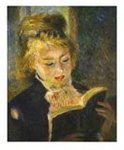Heart of Darkness tells a story about colonialism in the Congo, but it is so much more than that. It is more about men's 'hearts of darkness' and what they become after they leave 'civilization'. Marlow is a steamship captain in search of Kurtz, who is one of the best ivory traders The Company has. It is said that Kurtz has become ill and The Company does not want to lose him because of his high productivity in obtaining ivory. But just how does Kurtz maintain his high productivity?
Kurtz isn't the only one to leave his morals behind when he leaves 'civilization'. The actions of The Company Men leave moral questions as well. Is it only the ladies, as Marlowe states, who try to uphold society's mores, or are they just deluded in thinking society, left to itself, has any morals?
It's queer how out of touch with truth women are. They live in a world of their own, and there had never been anything like it, and never can be. It is too beautiful altogether, and if they were to set it up it would go to pieces before the first sunset.This book is short but very complex. It is one that I'll definitely read again at some point to try to understand it a bit better. I'm still trying to figure out "The horror! The horror!"
Some interesting passages:
I let him run on, this papier-mache Mephistopheles, and it seemed to me that if I tried I could poke my forefinger through him, and would find nothing inside but a little loose dirt, maybe.
No, I don't like work. I had rather laze about and think of all the fine things that can be done. I don't like work -- no man does -- but I like what is in the work -- the chance to find yourself. Your own reality -- for yourself, not for others -- what no other man can ever know. They can only see the mere show, and never can tell what it really means.
The mind of man is capable of anything – because everything is in it, all the past as well as all the future. What was there after all? Joy, fear, sorrow, devotion, valour, rage – who can tell? – but truth – truth stripped of its cloak of time. Let the fool gape and shudder – the man knows, and can look on without a wink.
I assure you to leave off reading was like tearing myself away from the shelter of an old and solid friendship.
The point was in his being a gifted creature, and that of all his gifts the one that stood out preeminently, that carried with it a sense of real presence, was his ability to talk, his words -- the gift of expression, the bewildering, the illuminating, the most exalted and the most contemptible, the pulsating stream of light, or the deceitful flow from the heart of an impenetrable darkness.
When they are gone you must fall back upon your own innate strength, upon your own capacity for faithfulness. Of course you may be too much of a fool to go wrong -- too dull even to know you are being assulted by the powers of darkness. I take it, no fool ever made a bargain for his soul with the devil; the fool is too much of a fool, or the devil too much of a devil -- I don't know which. Or you may be such a thunderingly exalted creature as to be altogether deaf and blind to anything but heavenly sights and sounds. Then the earth for you is only a standing place -- and whether to be like this is your loss or your gain I won't pretend to say. But most of us are neither one nor the other.
Whether he knew of his deficiency himself I can't say. I think the knowledge came to him at last -- only at the very last. But the wilderness had found him out early, and had taken on him a terrible vegeance for the fantastic invasion. I think it had whispered to him things about himself which he did not know, things of which he had no conception till he took counsel with this great solitude -- and the whisper had proved irresistibly fascinating. It echoed loudly within him because he was hollow at the core....
But his soul was mad. Being alone in the wilderness, it had looked within itself, and, by heavens! I tell you, it had gone mad. I had -- for my sins, I suppose -- to go through the ordeal of looking into it myself. No eloquence could have been so withering to one's belief in mankind as his final burst of sincerity. He struggled with himself, too. I saw it -- I heard it. I saw the inconceivable mystery of a soul that knew no restraint, no faith, and no fear, yet struggling blindly with itself.
1902, 80 pp.
Rating: 5



